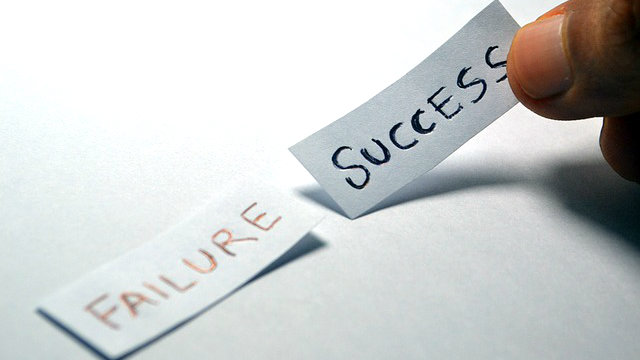 Reading Time: 4 minutes
Reading Time: 4 minutes“You’re a failure.” It’s a phrase no one wants to hear, and it can haunt our choices in life.
It’s no fun to hear it from someone else, but it’s even worse when those words come from within ourselves. This kind of negative self-talk can have a devastating impact on our self-esteem, our confidence, and our ability to improve ourselves.
In order to avoid hearing those words, we resist taking risks or even taking action at all.
Believe me, I know that making a mistake is frustrating. You get angry at yourself and feel dumb, ashamed, or overwhelmed. “Failure” and “mistakes” can cause doubt and often anxiety, tension, and worry, as well. Certainly, none of these things feels good. It’s natural to avoid these feelings, and certainly, failing doesn’t feel like “progress” in the moment.
So our natural instinct is protect ourselves from failure and avoid mistakes at all cost.
Let me say that last part again: at all cost.
Because there is a cost to a mistake-free life.

A Life Free of Failure
The problem with a life free of failure is that it’s impossible to grow and improve without failing. In fact, failure is essential to expanding your skills and knowledge and to moving beyond the confines of your comfort zone. And what lies out there beyond the fringes of comfort are things like fulfillment, satisfaction, dreams, and our passions. Things like health, happiness, and love.
But whether we’re approaching a new job, a new project, or a new lifestyle, we shouldn’t expect to do so flawlessly.
It is more helpful to focus on getting better through small but incremental changes — interspersed with stumbles. Small steps allow for small mistakes, and you may be surprised at the cumulative impact of these steady inches forward, even with those small steps “back,” as well.
The key to taking on positive change and growth in your life with confidence?
Give yourself permission to fail.
It may seem counterintuitive, but the truth is that when you feel free to make mistakes you make fewer of them. Studies have proven this.
When you approach new or difficult situations with a “progress” mindset as opposed to the “perfect” mindset, you give yourself the freedom and space you need to get better, to experiment, to play, to be real. The “progress” mentality relieves you of the anxiety and frustration that inhibit critical and creative thinking and threaten to undermine your performance.
The expectation you have of yourself is no longer rooted in avoiding all mistakes and instead is about exploring the path in front of you, taking turns that get you “off track,” and learning more about where you’re going in the process.
How to Shift Your Thinking from Perfect to Progress
1. Know that there will be difficulties and discomfort with the unfamiliar.
Going in with this understanding gives you the room you need to adjust and the flexibility to make mistakes without panicking. As you demonstrate to yourself that you can handle these challenging moments, you’ll try more — and your abilities will grow and develop accordingly.
2. Ask for help.
You don’t have to go it alone and, frankly, you shouldn’t. Grab a buddy or join a group that is in alignment with your goal. Doing something with another person or other people gives you both support and accountability. It may also provide you with new ideas on how to problem-solve or move forward toward your ideal outcome.
3. Quit.
In talking about his book, The Dip, Seth Godin pointed out that “winners do quit, and quitters do win.” He explained that quitting does not always equate to failure. It can actually be progress if you have determined that the goal you’re pursuing isn’t worth your resources and effort, or isn’t really what you’re after. If you do quit, realize that the courage it took to walk away from something that isn’t right for you is actually a success.
4. Watch the negative self-talk.
Often, negativity is driven by comparing yourself to others. But the only person you really want to compete with is the person you were yesterday. Different people are on different paths, and refocusing on your own goals and aspirations, rather than concentrating on where others are on their journeys, is invaluable for your progress. The less time you spend comparing yourself to others, the more time you have for introspection and reflection on how you’re progressing.

You Can Never Actually Be a Failure
Remember, failure isn’t personal unless you make it personal. A failure to accomplish a goal doesn’t mean you are a failure. A failure is a thing that happens. You are a person separate from that thing.
A “failure” is really nothing other than “a bad fit.” Think of your endeavors and explorations as simply trying things on in life. When something doesn’t fit, you try something else — and you keep trying and honing your choices until you find yourself at your goal.







